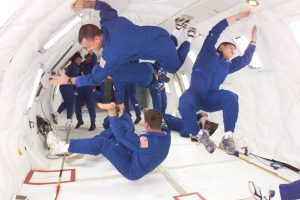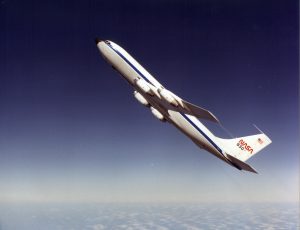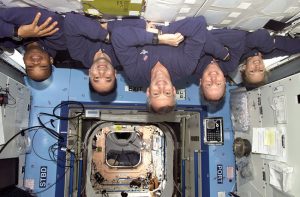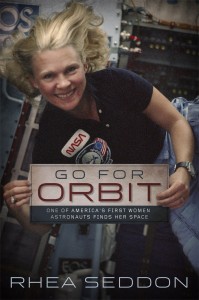Barf Bag Anyone?
Throwing up is never pleasant. Imagine what it would be like in weightlessness.
Two thirds of space travelers have some form of motion sickness, ranging from dizziness to nausea to vomiting. It might have been present in the early days of spaceflight, but it became more apparent with the Space Shuttle. From sitting on the launch pad to being weightless took eight and a half minutes. Unlike astronauts who flew in cramped capsules, Shuttle crew members could unstrap immediately, float around, and soon fly headfirst downstairs to the living quarters.
Could motion sickness be predicted in certain people? Would a person adapt to it on his or her first flight and never have it again? If being prone to having it couldn’t be foretold, could it be prevented— or treated when it occurred in space? Most important, how do you keep the stuff that’s regurgitated from flying all over the cabin and grossing out other crew members…and making them sick?
This last issue was easy for the engineers.
Several prototype space barf bags were developed. The one that made it into production was one that was held snugly to the face and could be closed quickly to keep the floating debris from slipping out. It even had a little cloth towel attached that allowed the victim to wipe his or her face.
Scientists began to recruit subjects from the general population to test each person’s likeliness to have the problem. They used various torture devices: spinning chairs, simulators that rotated the subject head over heels, eye goggles that reversed vision of everything, and flights in an airplane (aptly dubbed the Vomit Comet) that went up and down like a roller coaster. Lots of those folks got sick. The astronauts said regular people just didn’t have the Right Stuff; therefore, real astronauts were recruited for the studies. (Yuck.)
Some of us were susceptible and others were not, but when we were in orbit, there was no correlation between those who got motion sick quickly with ground testing and those who got sick in space.
Can you train a person not to get sick if he or she is prone to it? More whirling around or floating up and down before and after biofeedback or other training. (More yuck.) It seemed to help on Earth, but it didn’t work when the astronaut got to space.
Finally, a medication was found that could be given inflight at the first onset of nausea, and it worked! But the scientists wanted to understand the root cause of space motion sickness and study the medication for side effects. None of the astronauts would volunteer for the proposed studies. The problem had been solved as far as crew members were concerned.
Enough science already! Let’s go fly.
– Rhea
We’d love to add you to our email list. If you have not yet signed up, please do so by clicking here.
Follow me on Twitter and Facebook!






” Lots of those folks got sick. The astronauts said regular people just didn’t have the Right Stuff; therefore, real astronauts were recruited for the studies. ” Bill Pogue was in the Thunderbirds and he still got sick in space….
How timely! I just flew the zero G flight with 2 friends on Feb 20. Not only did I not get sick, I felt no nausea at all. Certainly I had the Right Stuff. But Dr. Seddon burst my bubble; no correlation between zero g flights and SAS on orbit. I still think I would not get sick in space; unfortunately I will never find out for sure.
don’t blame any of you for not volunteering for the last tests. If meds worked so be it!!!! Brave people! Very brave people!!
Col. William R “Bill” Pogue, Pilot for Skylab 4 was one of those who wouldn’t get the slightest amount of nausea in any test or flight here on Earth. However when he was in orbit on Skylab he was among the sickest of astronauts for a few days until he became oriented to life at Zero G. 84 days in orbit, an American record for 20 years.
Congrats on your Vomit Comet flight Mel. The films of those flights look like it would be a real blast.
I would volunteer for any zero-g flight out there. Already have done a few, just recently I have been on a European Space Agency science flight (see more here: http://www.zerog2002.de/english.html). Yes they use meds (if you want to), but I never got sick anyway. They say it is more important to enable the scientists to do their work. Unless you are a test subject that is not allowed to take the meds. But generally the sickness rate on the ESA flights is just about 5% and they fly 31 parabolas each flight.
What I found very intriguing is that most people that have taken part actually love the zero-g flights! I suppose the astronauts do as well!